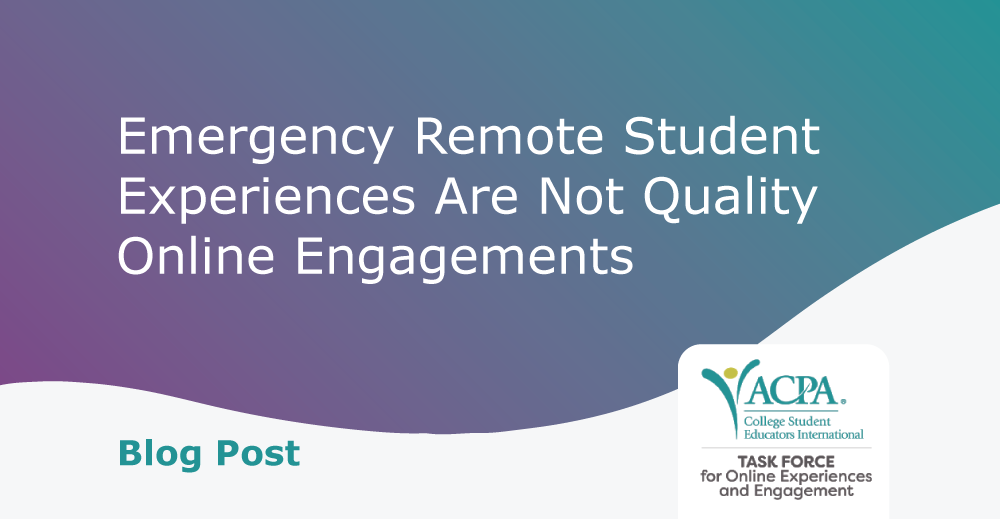
It’s been two years since higher education institutions took a hard turn towards emergency remote plans due to the COVID-19 global pandemic. This emergency pivot has disrupted many common practices we once knew as best practices, and we have yet to catch up to the demand of our students and the services they need. Trying to find a solution, some institutions piloted hybrid and flexible models (https://library.educause.edu/resources/2020/7/7-things-you-should-know-about-the-hyflex-course-model#:~:text=The%20hybrid%20flexible%2C%20or%20HyFlex,can%20decide%20how%20to%20participate.), while others remained completely remote. During a pandemic, there is no doubt that higher education’s student and academic affairs staff have displayed an immense amount of care, creativity, and commitment by reimagining how to deliver their services to their students amidst an unprecedented time.
Now that universities are considering back-to-campus plans or pioneering a newer hybrid model to find a new normal, the fact is that students are still wanting to retain the flexibility and options from online learning environments after the pandemic (Digital Learning Pulse, 2021, https://info.cengage.com/wrec_PulseSurveyResults_1470945). An Inside Higher Ed article by Members of the National Council for Online Education (2022, https://www.insidehighered.com/views/2022/02/03/remote-instruction-and-online-learning-arent-same-thing-opinion) made a great point when they distinguished the differences between emergency remote instruction for faculty in classrooms to the planned experience of an intentionally designed online learning environment. We’ve all had to pivot by providing resources in an online format, but how many of us had the luxury to learn about best practices and models in online learning and intentionally design these online learning experiences for our students? The answer, I believe, would be, “not many of us.”
The ACPA Online Experiences and Engagement (OEE) Task Force has formed under the guidance of Lindsay Smith, Chair of the OEE Task Force and Program Mentor in the College of Business at Western Governors University, to help us explore this new world of expectations and possibilities in defining best practices for intentionally designing online experiences and engagement for our students. The OEE Task Force defines online experiences and online engagement in the following way.
- Online Experience – interactions with systems, applications, and other people through digitally mediated platforms.
- Online Engagement – educationally purposeful digitally mediated experiences in which the amount of psychosocial energy invested by an individual is met with a commensurate degree of investment by the institution.
Unlike emergency remote services, online experiences should be high-quality and strategic designs of developmental or academic occurrences that leverage inclusive learning activities, intentional community-building, opportunities for interaction, and student learning assessments to align with learning objectives. Further, we should strive for online engagement by intentionally planning or facilitating social, emotional, cultural, or academic activities to elicit student behavior that influences interconnectedness, sense of belonging, and commitment to their community or institution. Let’s take a beat to breathe, reflect, assess, and reimagine our emergency online services in a way that gives space for intentionality. As we all embark on the next journey to find the new normal, the OEE Task Force commits to helping guide the conversation to and evolve online student services and resources in a more accessible and inclusive manner by providing professional development and leadership to address the intersection of student affairs and online experiences and engagement.
References:
- Redmond, P., Abawi, L. A., Brown, A., Henderson, R., & Heffernan, A. (2018). An online engagement framework for higher education. Online learning, 22(1), 183-204.
- https://www.insidehighered.com/views/2022/02/03/remote-instruction-and-online-learning-arent-same-thing-opinion
- https://onlinelearningconsortium.org/emergency-remote-instruction-is-not-quality-online-learning/
- https://www.insidehighered.com/news/2021/04/27/survey-reveals-positive-outlook-online-instruction-post-pandemic
- https://library.educause.edu/resources/2020/7/7-things-you-should-know-about-the-hyflex-course-model
About the Author:
- Colleen M. Smith (she/her) is a doctoral candidate at Florida State University’s Learning Design and Performance Technologies program researching inclusive online learning environments. Her experience working with grants funded by the Bill & Melinda Gates Foundation, National Science Foundation, and TRiO has ignited her interest in designing inclusive online learning environments and engagement for culturally diverse learners.
https://twitter.com/cmmarqua
Online Experiences & Engagement Task Force provides opportunities for professional development about contemporary issues in engaging college students beyond coursework and creating meaningful experiences in a virtual space.

